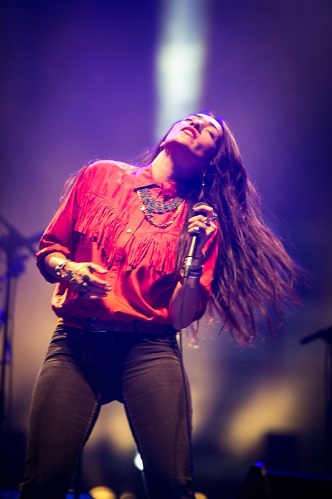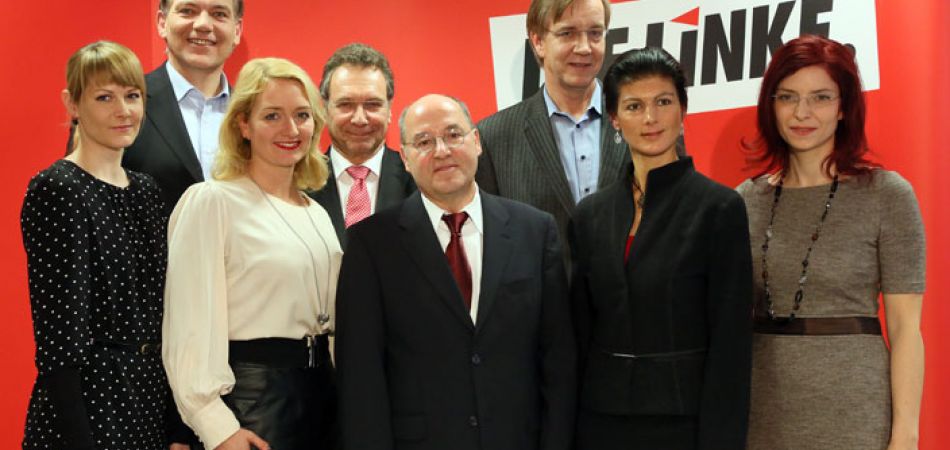Translated from the French weekly newspaper Le Point
Morocco – Hindi Zahra: Amazigh Grace
The Moroccan singer returns with a highly anticipated album, Homeland, after her 2010 success with “Beautiful Tango”.
Interview.
In the wake of the success of this heady and flexible “Beautiful Tango”, that was released in her first album, Handmade, obvious critical and public success which will earn her the Constantine Prize and a Victoire de la Musique. Her special vibrato is still there, light and dense at the same time. In Homeland, her new album, we also find the whole musical universe of Hindi Zahra, blues, jazzy, Cape Verdean, Gnawa, and gypsy rhythms which also make her artistic signature so unique. In Berber, English, and French, Hindi Zahra gracefully echoes her melodious melancholy and rhythmic nonchalance through eleven pieces. Complete artist, painter but also actress, we could also see her as the wife of Tahar Rahim in the beautiful film by Turkish director Fatih Akin and she has just shot in the film by Iraqi-Moroccan director Tala Haddid, The Narrow Frame of Midnight.
Interview.
Le Point Afrique: Why this title, Homeland?
Hindi Zahra: I started writing and recording in Morocco, and the word “Homeland” kept coming up in my mind. It’s all the more strange that I wanted to do it in my country to give this album a more Moroccan dimension than the last one, but the result is not that much. I put influences from very different music into it, music from Cape Verde, Brazil, Iran, Cuba, India. But in the end, this album is maybe like Morocco which also carries all kinds of different traditions, between Africa, Europe, the Mediterranean. My music is like my country, everywhere. This question of Homeland, the question of “home” also interests me a lot: Is it necessarily one’s native country or can it be any country with which one has affinities?
And your personal answer?
I think it is inside, because in the heart there can be several countries cohabiting. I am Moroccan, but I also find myself in many other places.
How to qualify your music? It seems so multiple that we don’t know in which category to put it …
So much the better (laughs). I got to hear “world music”. Why not, I’m not against it. Yes, I have influences from all over the world. Our generation of musicians, nurtured from multiple sources, is defined less and less in a single style. Even I who nevertheless created my music, I cannot qualify it because I absolutely want to keep this diversity of sounds without having to comply with a particular label. Those who forcefully label my music lock themselves in a vision, but they don’t lock me in.
You sing for the first time in French. There are also texts in English, in Berber. How do you choose which language to write in?
It is the languages that choose me and it is they that choose the songs. When I start to write, sometimes I have a simple gimmick that pops into my head, and then I continue in the language that has prevailed.
The song in French “Un jour” has something of Barbara.
Thank you … It’s funny you tell me that. It touches me because she’s someone I listen to a lot. She and Françoise Hardy accompanied me a lot before the composition. I love their writing and their melancholy, their elegant spleen.
You are also a painter. Do you work on your music like your paintings?
Yes, the two types of creation are linked. In Morocco, I had my workshop, my guitar, my studio, and I switched from one to the other. As with painting, these are layers that I layer one after the other. Then I let it sit for a while, add this, take that away. I always work on several canvases at the same time, as I work on several songs at the same time. I wait for it to take shape, I walk away, forget, come back to it. In Morocco, we say in Berber when we knead the dough of the bread “ajit ayi khmel”, “let the leaven set”; It’s the same, I let the canvas or the song rest for it to take …
How did the desire to sing in Berber come about on non-traditional compositions?
Because of its articulation, the Berber language is easier to use in singing than Arabic, for example. Berber is similar in this to English which is also a flexible language for singing. Anyway, I could not have sung Berber in the traditional way as the great singers do in Morocco. What interested me was precisely to take this language out of its traditional circuit and share it.
Your native and family culture obviously holds a large place in your influences?
My mother was in theater but did not complete her artistic history. Somehow I think I’m continuing it for her. My family is a family of musicians, famous percussionists in Morocco. They were part of a tradition of Moroccan music, but on the other hand, they collected vinyls of rock, jazz, blues. In my family where several generations rubbed shoulders, my grandmother listened to Berber music, my mother listened to Fairouz and Oum Kheltoum, my uncles of reggae, chaabi, blues. And I was listening to black American music. So it became natural for me to compose and sing. And then the first time I went on stage, it was no longer negotiable, I was in my place.
Your album contains African, jazz, Cape Verdean sounds, but cannot be described as oriental …
Quite simply because I am not oriental in fact and that I do not make Arab music. Seen from France, the Maghreb is Arab, but it’s not that simple. Already, Arabic music does not exist as such but has known Phoenician, Persian and Indian influences. This notion of the Orient is a vague notion. The Middle East has its history and its culture, the Maghreb and Africa have theirs. Why is the music of the Balkans, which has known more Middle Eastern influence than Morocco, not called oriental music? Why do we systematically call Maghreb music oriental and not African? Beyond that, the whole question of identity also arises. The Maghreb must rediscover its Africanness, look south, and stop looking east or north. Everyone is called “Arab”, but the Maghreb is not inhabited by Arabs but by North Africans.
Does Africa hold a special place for you?
Would not Africa be able to add something more to what is happening in the world and could it not bring to the culture of the world something more important than its gold, its uranium? My answer is yes, definitely. I am passionate about African culture. For example, I have studied certain African cosmogonies that tell the story of the evolution of life on Earth by symbolism, which modern science has validated only with Darwin. When I see the intelligence and the complexity of the organizations of certain African societies, I tell myself that we still have everything to learn. For example, the Pygmies only tolerate human organizations of 30 people and no more, because beyond that it is unmanageable. In Kabyle society, a man who had committed a blood crime could only escape banishment if a woman symbolically put a veil over his head as protection. The only two peoples to have known women warriors are the Celts and the Berbers. Democracy was known in Berber societies through the organization of the Tajmaât, these assemblies which regulated social life without any interference from religion. Berber is 6,000 years of culture, from Morocco to Egypt, with deep ramifications in sub-Saharan Africa. It is a living culture and it should remain so. All of this is valuable to study and to keep.
https://www.youtube.com/watch?v=lXsx9NLNSUs
Le Point



Leave a Comment